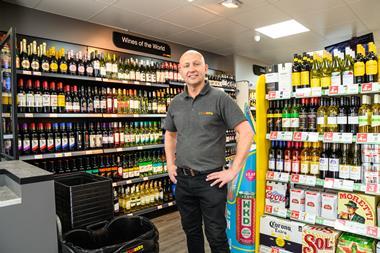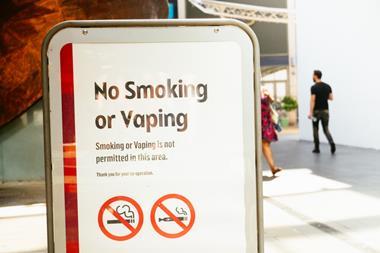Embedded into every neighborhood, usually on the high street or occupying a corner store, many independent retailers work long hours - the majority seven days a week - to provide us with the essentials.

These efforts can go unnoticed but over the past two years, we were reminded as to the crucial role convenience retailers play in serving their customers, and communities, particularly during uncertain and challenging times.
As essential workers during lockdown, shopkeepers offered more than just convenience; whether delivering goods straight to our door or a moments reprieve thanks to a friendly countertop chat, we were grateful for their efforts and welcomed the interaction.
Now, a new pillar of community-retailing has emerged that while largely unseen, has the potential to help millions of people throughout England. The ‘Big Switch’ report reveals for the first time how retailers could be supporting their customer base of adult smokers abandon cigarettes, by improving access to ‘smoke-free’ products, such as e-cigarettes and heat-not-burn products, if they’re unable to quit completely which is always the best option.
The analysis, which involved 1,400+ store owners, found a third of convenience retailers in England would completely replace cigarettes for alternative products to help smokers make a better choice (The Big Switch Report) . For many retailers, the ‘stock and sell’ mentality has been replaced with a desire to do more, with almost 7 in 10 seeking better relationships with customers to help them abandon cigarettes (Ibid).
Many retailers would go further, with almost 7 in 10 open to collaborating with competing stores (Ibid), and more than half (58%) willing to build relationships with local pharmacies, GP surgeries, and stop-smoking services (Ibid), all for the purposes of achieving a smoke-free future, and faster.
This appetite to build better connections is reciprocated by the customer, a thousand of whom were surveyed for this report. 8 in 10 ex-smokers who have now switched completely to smoke-free products, would have welcomed more advice from shopkeepers on alternatives products (Ibid), with 64% agreeing that a convenience store is an appropriate place to learn more about these products (Ibid).
Although smoking rates are in decline, 5.7 million adults in England continue to smoke (Office for National Statistics 2020). Whilst the best option is to quit tobacco and nicotine products completely, smoke-free products that are regulated and have been scientifically substantiated as less harmful could significantly benefit wider public health.
91%t of England’s 38,000+ independent shopkeepers stock smoke-free products (ACS Local Shop report 2020), meaning that they have the potential to increase the proliferation of science-based alternatives, particularly in areas where smoking rates are disproportionality high.
A retailer movement such as this, with the product range, knowledge, and more importantly, the willingness to build more meaningful connections with customers and community partners, has the potential to accelerate England’s journey towards a smoke-free future.
Recommendations on becoming smoke-free convenience retailer:
1. Build connections with adult customers who smoke
The convenience sector should be a destination for adult smokers on their journey to becoming smoke-free. Retailers must move beyond transactional-based relationships and build connections, so they can offer advice and support that is trustworthy and actionable.
2. Bridge the knowledge gap
Retailers must take responsibility for their learning to close the knowledge gap and become a credible source of information. They must gain comprehensive knowledge of smoke-free categories, brands, and products - including the benefits and relative risks compared to smoking - to ensure recommendations are made based on individual needs and preferences.
3. Set up retail environments that are easy to navigate
Stores must accommodate customers by making the point of sale easy to navigate, so decisions can be made at, or away from, the countertop.
4. Encourage collaboration with the local retailer community
Collaboration is key to accelerating the journey to a smoke-free future. Retailers should seek best practice from other local retailers and be able to direct customers to nearby stores if their preferred smoke-free product isn’t available.
5. Embrace a smoke-free future
As customers shift towards the smoke-free category, retailers must ensure they’re future-proofing their businesses. The data from the Big Switch report suggests a phased approach, whereby retailers continue to sell combustible tobacco products whilst they test which smoke-products are effective – and tailor their gantries to suit.
































No comments yet